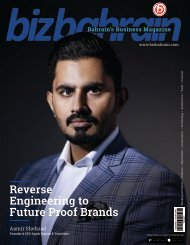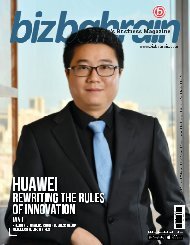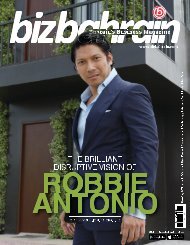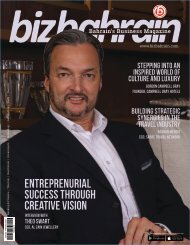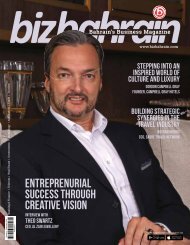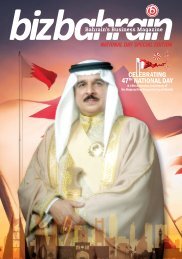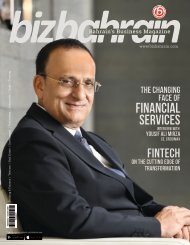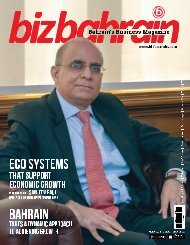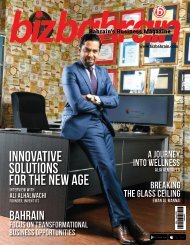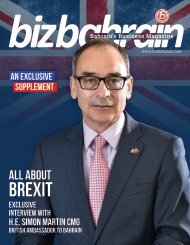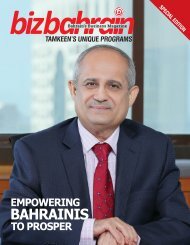BizBahrain April 2016
Create successful ePaper yourself
Turn your PDF publications into a flip-book with our unique Google optimized e-Paper software.
Interview | Dr. Farid Al-Mulla<br />
There is a lot of<br />
secrecy and there<br />
is a lot of trust<br />
involved, and the<br />
trust is based on<br />
confidence and<br />
longevity.<br />
Dr Al-Mulla started his banking<br />
career with Gulf International Bank<br />
(GIB) in 1983, from where he joined<br />
Bank of Bahrain and Kuwait (BBK) in<br />
1990, starting as Head of International<br />
banking and ending as CEO in 2001.<br />
In a fascinating interview at the<br />
Capital Club with bizbahrain Group<br />
Editor Reena Abraham, Dr Al-Mulla<br />
talks about the changes and challenges<br />
he has seen in private banking and the<br />
ethics and principles that have built<br />
the foundation of his success. Here are<br />
some excerpts from the conversation.<br />
Let’s start with the story behind Oasis<br />
Capital Bank. What defines it?<br />
The story starts in 2007 when I was<br />
approached by the main promoters<br />
behind Oasis Capital with the idea to<br />
create a private bank. Initially I was<br />
skeptical, as I thought that the barrier<br />
for entry into private banking was huge<br />
and dominated by the Swiss banks<br />
and by international banks. Private<br />
banking for me was the ultimate<br />
because you have the confidence of<br />
the most successful, the HNWIs. There<br />
is a lot of secrecy and there is a lot of<br />
trust involved, and the trust is based on<br />
confidence and longevity. These older<br />
institutions have been around for years<br />
and years, literally hundreds of years<br />
and above all their performance have<br />
perpetuated their existence.<br />
When we were established in July<br />
2008, within two months the world was<br />
faced with the global financial crisis.<br />
We started looking very closely on what<br />
the repercussions of the crisis were<br />
on investment banking. Our capital<br />
was intact, but as an institution we did<br />
not have the pedigree. It was a tough<br />
introduction to the world of investment.<br />
The learning curve must have been<br />
steep. What was the take away from the<br />
situation?<br />
Fortunately for us, and through the<br />
hard work of our staff and the support<br />
of our board, we managed to exit all<br />
our investments by 2015. We made a 51<br />
million-dollar profit, and distributed a<br />
good dividend in a very difficult market.<br />
In private equity, you are not a<br />
long-term player. You come in, you put<br />
the house in order, and you move on.<br />
Somebody else will then take it to the<br />
next level. Somebody else could make<br />
more money than you, and good luck to<br />
them.<br />
The increase in profitability<br />
resulted from successful exits from<br />
direct investments. Going forward, the<br />
plans are to leverage our track record<br />
and long-standing relationships with<br />
various partners and continue to look<br />
for suitable deployment opportunities<br />
in selective markets. Today, we have<br />
taken away the word “bank” from<br />
our name and function; we are an<br />
investment firm, and we are focused<br />
solely on private equity. In our second<br />
phase of investments, we have recently<br />
closed an investment in an online<br />
platform in beauty products in Europe<br />
You reported 51.2 million for last year,<br />
that’s a nearly 4 times increase from<br />
the previous year, so how would you<br />
differentiate your investment strategy<br />
against other investment banks in<br />
Bahrain?<br />
Having gone through the early<br />
experience and the massive challenges<br />
we faced, I think the important thing is<br />
to learn and to analyze your mistakes.<br />
Is there one infallible rule or guiding<br />
principle that works for private<br />
banking?<br />
Every firm will have its own<br />
distinguishing brand message, but<br />
perhaps there is one simple and<br />
universal rule; know your customer/<br />
investor and manage the product/asset<br />
well.<br />
Also, while we worry about<br />
instabilities of markets, oddly enough<br />
we also welcome it. Volatility in<br />
markets create risks and opportunities,<br />
this is precisely the type of challenge<br />
we like to take.<br />
We have streamlined our Business<br />
model to focus on key strengths<br />
and leverage our track record and<br />
longstanding relationships with leading<br />
PE firms. Oasis Capital will effectively<br />
provide its investors with access to<br />
“handpicked” individuals direct PE<br />
investments from top tier firms at very<br />
competitive ad transparent costs<br />
What are the challenges for the banking<br />
sector, particularly the private banking?<br />
We are not in 2008 with a financial<br />
and banking crisis, but I believe there<br />
could be a possible repetition here in<br />
the emerging markets, maybe not to the<br />
magnitude of 2008, but still at a high<br />
level.<br />
What happened between 2008 and<br />
now, and I am putting it very simply,<br />
was to combat the down turn by making<br />
money cheap to keep the ship afloat.<br />
But the side effect is that it will create<br />
another bubble, and this is where I<br />
come back to the point, banking is<br />
not a science. What the international<br />
community did between 2008 until now,<br />
honestly, is experimenting and like<br />
many things in life, like medicine, you<br />
don’t know the negative side-effects<br />
until years later,<br />
I think what happened between<br />
2008 and now has been a near miracle.<br />
We are very fortunate as a world we<br />
didn’t get into a situation like the 1930s<br />
with huge unemployment, and poverty,<br />
and the end result of a world war.<br />
In your opinion, what are some of the<br />
specific long-term reforms to create a<br />
stable and sustainable society?<br />
I hesitate to answer because there<br />
are so many variables. You can take<br />
May <strong>2016</strong><br />
33





